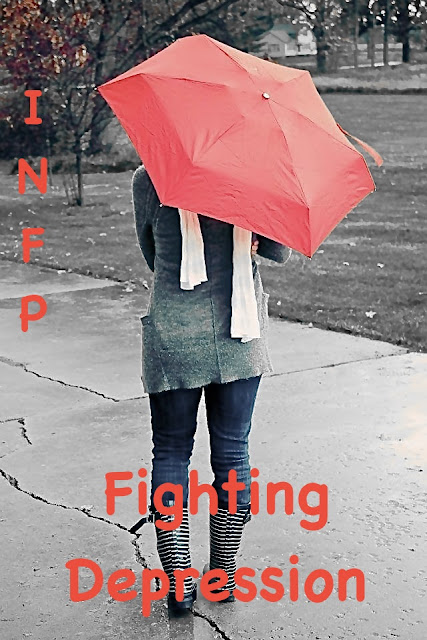INFP: Fighting Depression
Why is it that INFPs seem to struggle with depression, more so than other types? What is it about this personality type that welcomes in the blues?
First we will go over what about who INFPs are that make them so vulnerable to depression. Then we will look at what INFPs can do (or what you can do to help them) to fight depression.
INFPs are...
How to Help
INFPs are advocates for personal growth. This is a great thing because when we grow within our personalities, we become less susceptible to our weaknesses. Here we will look at each of the things that makes an INFP vulnerable to depression, and turn them upside down. We will use the same traits that make them weak to make them strong.
In the end, what makes an INFP the more vulnerable to depression than most is there longing for purpose. They are driven to make the world a better place, but that's a pretty tall order for one person. The INFP wants to do something meaningful with their life, and nothing really is great enough to satisfy that need. Think instead of what you have. Your family, your friends, your vocation, the lives you've touched. The people you've loved. What helps the INFP fight depression, in the end, is not finding a "greater purpose". It is simply realizing the value of their life exactly how it is already.
First we will go over what about who INFPs are that make them so vulnerable to depression. Then we will look at what INFPs can do (or what you can do to help them) to fight depression.
INFPs are...
- Idealists INFPs strive for the ideal. The ideal job, the ideal spouse, the ideal home, the ideal church, the ideal school, the ideal daily routine, the ideal personality, the ideal version of every single thing. Every day the INFP struggles with these high standards. The house isn't clean enough. Their job isn't satisfying enough. They didn't check everything off their to-do list. They haven't achieved their full potential in life. These expectations they have for themselves and their lives can leave them feeling highly unsatisfied and depressed.
- "Empaths" Although there is actually nothing supernatural about and INFP's empathy, it can feel that there is. The INFP feels others pain as if they themselves were the ones suffering. An INFP is a great listener because they feel so involved personally in your story. INFPs get involved in movies and books as well, and you may catch them tearing up during dramatic scenes. But fiction they can recover from quickly. It's real life that weighs them down. Watching the news can be especially heartbreaking for the INFP. Hearing about all the horrible things happening in the world will leave the INFP feeling hopeless and depressed.
- Weighed down by guilt The INFP does not keep score of the people who have hurt them. But they keep a strict record of their own mistakes and sins. They torture themselves by remembering them again and again and again. An INFP who is weighed down by a lot of guilt will suffer health problems because of it. It may take different forms at different times such as headaches, teeth grinding, or stomach aches. These are ways the body finds release from stress. The INFP is a type often described to be "in touch with their spirituality". They are very aware of their soul and its faults. They are bearers of spiritual burdens. They crave forgiveness from people and especially from God. Yet even when they believe they have it they may still hold on to that guilt. They need to hear again and again and again that they are forgiven.
- Unrealistic in their expectations Some find the INFP's perfectionism to be a bit demanding especially in romantic relationships. But keep in mind that the INFP is a hundred times more demanding of themselves than they are of others. The INFP sees endless possibilities but struggles with the followthrough. Their constant disappointment in themselves can leave them unsatisfied and depressed. Their high standards of others, on the other hand, can actually be a positive thing. The INFP will actually see you to be as wonderful as their expectations of you are, whether you live up to them or not. The INFP is generous and does not hold your flaws against you. An INFP finds something to love and defend, even in their enemies.
- Overthinkers INFPs tend to overanalyze every word, event, and action. They are often are very accurate in their analysis. However, this tendency can also result in false conclusions. Whether wrong or right, when an INFP makes assumptions or deductions and points them it, it can annoy others. People don't always like to be analyzed, it can be uncomfortable or the information may not be true. Aside from potential damage to relationships, the INFP may suffer other ways from their tendency to overthink. Overthinking draws the mind out of the present. Sometimes the INFP's overthinking turns into obsession. Especially if it is something to worry over.
- Perfectionists INFPs are rarely content with themselves or the reality they live in. Some say this is because the INFP lives in a dream world. But that's not really accurate. The INFP can be pretty down to earth. They simply long for a perfect earth. They see pain, suffering, and darkness and they long for something brighter. The INFP is often a perfectionist about small things, too. They won't give themselves credit for their talents because they haven't perfected them yet. They will toss out their projects because they believe them to be inadequate. Their friends may see their work to be wonderful, but the INFP won't really believe the compliments. Their perfectionism also leaks into their relationships and can make others feel as if they aren't good enough for the INFP.
- Loners INFPs are more comfortable than most types with being alone. They have a rich inner world that needs lots of private time to maintain. They need a lot of time to themselves to recharge, process new information and feelings, and to imagine. INFPs often feel as if they are "better off alone" because they can't hurt others or be hurt by others when they're by themselves. What they often do not understand is that it can hurt themselves, and others, to withdraw from stressful situations. Things swept under an INFP's rug can build up to a mountain height, and explode in a lava of anger and sadness that cannot be controlled.
How to Help
INFPs are advocates for personal growth. This is a great thing because when we grow within our personalities, we become less susceptible to our weaknesses. Here we will look at each of the things that makes an INFP vulnerable to depression, and turn them upside down. We will use the same traits that make them weak to make them strong.
- Idealists It is ok to work toward something better. What the INFP needs is to find the balance between working toward something better and being content with the way things are at present until, if ever, the situation improves. List the things you are thankful for about in the present. Take pleasure in your small accomplishments. Give yourself credit for the work you do. Take a look around you and realize that nobody is perfect. Everyone's house is messy, everyone gets a poor grade on a test sometimes. It's ok to relax without feeling like you should be doing something productive. You need rest in order to function. Once you get that thing you know will make you happy, you will want something else. Don't hate yourself for your being idealistic. It makes you an extraordinary person. Just know that your life is worthwhile exactly how it is.
- "Empaths" Your empathy makes you a compassionate person, and that is an invaluable quality. It makes you an amazing friend, a great parent, a wonderful spouse. Whoever your friends and family are, they are lucky to have you in their lives. Limit your time watching the news. When friends relay their misfortunes to you let your empathy come out in the conversation. But don't let it settle in your heart. Visualize letting it go as if it were a bird you are releasing to the wind. Letting go doesn't mean you don't care. You can still care without bearing the weight on your own shoulders.
- Guilt Your sensitivity to guilt is part of what makes you who you are. Your sense of right and wrong makes you kind, moral, and fair. Your values are important to you and that is a good thing. Visualizing letting go is helpful here as well. Imagine each mistake or wrongdoing as a weight on your heart. Then take each one and crumble it up. Toss it out of the car window behind you as you move forward. If you are religious, make time for church and devotions. Remind yourself again and again of forgiveness and removal of guilt.
- Unrealistic expectations Having a high standard of living, or a high standard for yourself is not always negative. If you had no standards you wouldn't have a job or a roof over your head, and you wouldn't be a very nice person. The INFP doesn't necessarily need to lower their expectations. It is good to strive toward something better. What the INFP needs is to be content with the way things are until, if ever, the situation improves. List the things you are thankful for. Take pleasure in your small accomplishments. Give yourself credit for the work you do. Take a look around you and realize that nobody is perfect. Everyone's house is messy, everyone gets a poor grade on a test sometimes. It's ok to relax without feeling like you should be doing something productive. You need rest in order to function. Don't hate yourself for your being idealistic. It makes you an extraordinary person.
- Overthinkers A good tactic here is to take your analytical skills and preoccupation and redirect it into a positive outlet, such as a hobby. Something as simple as a jigsaw puzzle can help an INFP channel their everpresent desire to figure something out. Or finding a subject of interest and learning everything about it. Or taking up a new artistic hobby like sketching. If an INFP finds they cannot refocus their thoughts, they may find it very beneficial to write down what they're thinking on paper. This will provide them instant relief as well as helping them let go.
- Perfectionists INFPs are in a constant struggle with their two opposing traits: Flexibility and perfectionism. The INFP has a natural strength of flexibility which allows them to adapt to change and making that change just as useful to the ultimate goal as the original plan would have been. This strength can be used to combat their rigid standards. Be flexible with yourself and others. Adjust to mistakes and imperfections. Make them work to your advantage. And if you can't, then forgive them and work around them. The INFP who is religious will usually have an easier time coping with imperfections because there is a promise of something better to come.
- Loners You've heard the advice from your mom many times. "Make yourself go out. You'll be glad you did." And you went out. And you did have fun. Sometimes. But sometimes you didn't. And those sometimes keep you inside. It's a lot of effort for you to make small talk, to fake interest, to hold back from being the quirky person you are. Sometimes you slip up and people see the real you, and that makes you uncomfortable. You don't want to be uncomfortable. Well, good news: you don't' have to go outside your comfort zone in order to fight depression. What you do need to do is to stop trying to do everything on your own. The people who are worth your time don't care that you're quirky. They think it's charming. They don't judge you, they support you. Know that you can trust these people. When they offer to help you, try to accept. I know it will be difficult. But it's ok to accept help. You probably feel like no one wants to help you. But how often has someone tried to help, and you push them away, maybe even unintentionally? It can be very difficult for you to open up and talk about what's bothering you. But there are people who want to listen and won't think less of you. Try this out today. Ask someone for help. Maybe you want help with the dishes. Maybe you would benefit from talking about something that's on your mind. Maybe you even just need a distraction and want to do something fun. Whatever the case, start asking once in a while. People won't always say yes, but it's worth asking. You might be surprised at what people are willing to do for you. And you might be surprised how much weight it lifts from your shoulders.
In the end, what makes an INFP the more vulnerable to depression than most is there longing for purpose. They are driven to make the world a better place, but that's a pretty tall order for one person. The INFP wants to do something meaningful with their life, and nothing really is great enough to satisfy that need. Think instead of what you have. Your family, your friends, your vocation, the lives you've touched. The people you've loved. What helps the INFP fight depression, in the end, is not finding a "greater purpose". It is simply realizing the value of their life exactly how it is already.



Comments
Post a Comment